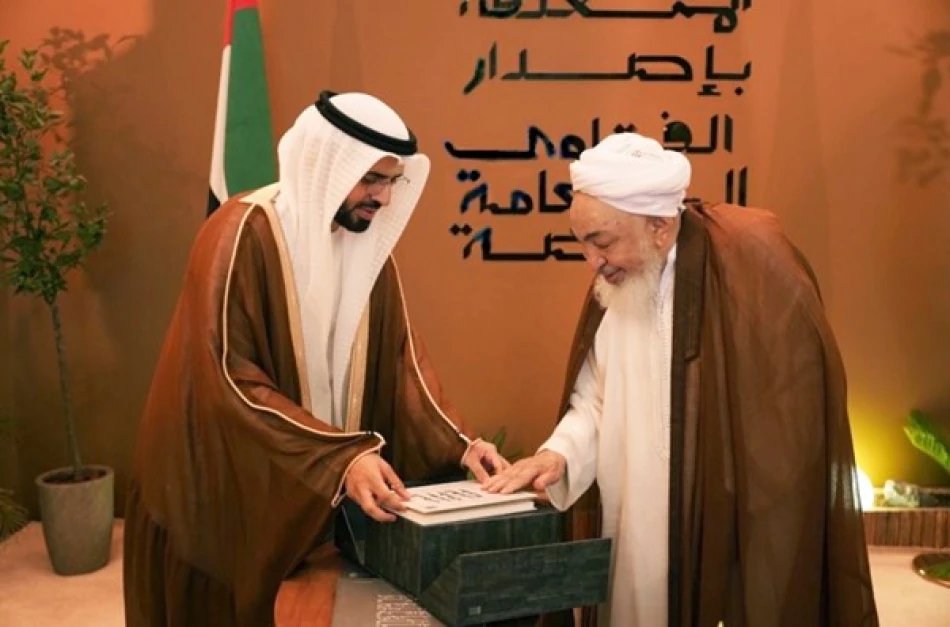
UAE Fatwa Council Launches Special Edition on "Conference on Sharia-Compliant Adaptation to Scientific Advancements
UAE Religious Authority Publishes Groundbreaking Guide on Islamic Law and Modern Technology
The UAE's top Islamic legal body has released a comprehensive five-volume research collection addressing how traditional Islamic jurisprudence should adapt to cutting-edge technologies including artificial intelligence, space exploration, and climate science. The publication signals the Emirates' growing role as a bridge between Islamic scholarship and technological innovation, potentially influencing how over 1.8 billion Muslims worldwide approach modern scientific developments.
Bridging Ancient Wisdom and Modern Innovation
Sheikh Abdullah bin Bayyah, Chairman of the UAE Fatwa Council, launched the special edition containing research from the Second Global Conference "Towards Islamic Legal Integration of Scientific Developments," held in November 2023. The timing reflects the UAE's strategic positioning as both a regional tech hub and center for progressive Islamic thought.
The five-volume collection tackles some of the most pressing questions facing Muslim communities in the digital age: How should Islamic law view artificial intelligence? What are the religious implications of space exploration? How do climate change policies align with Islamic environmental principles?
Practical Applications for a Digital Ummah
Unlike purely academic exercises, this research aims to provide actionable religious guidance for everyday challenges. The collection covers medical ethics, family medicine through an Islamic lens, and space-related religious questions that have become increasingly relevant as Muslim-majority countries develop their aerospace capabilities.
The UAE's approach mirrors similar efforts by other progressive Muslim nations. Malaysia has pioneered Islamic fintech regulations, while Indonesia has developed comprehensive digital Islamic banking frameworks. However, the UAE's publication stands out for its breadth, covering everything from AI ethics to astronomical calculations for prayer times in space.
Strategic Implications for Islamic Finance and Tech
This scholarly work carries significant implications beyond religious circles. Islamic finance, worth over $3 trillion globally, relies heavily on religious rulings to determine which technologies and business models comply with Sharia law. Clear guidance on AI and digital innovations could unlock new investment opportunities and product development.
For multinational corporations operating in Muslim-majority markets, these rulings provide crucial clarity. Tech companies developing AI products, space technology firms, and healthcare innovators now have clearer parameters for ensuring their offerings align with Islamic principles.
Competitive Advantage in Global Islamic Leadership
The UAE's proactive approach to Islamic jurisprudence strengthens its position as a leader in the Muslim world, competing with traditional centers of Islamic learning like Egypt's Al-Azhar University and Saudi Arabia's religious establishment. By addressing contemporary issues that older institutions have been slower to tackle, the Emirates positions itself as the go-to authority for modern Islamic legal questions.
This religious soft power complements the UAE's economic diversification strategy, supporting its ambitions in artificial intelligence, space exploration, and sustainable development. When religious authority aligns with national economic priorities, it creates a powerful synergy for attracting both investment and talent from across the Muslim world.
Setting Global Standards
The collaborative nature of this research, involving scholars from national and international Islamic institutions, suggests these guidelines could influence religious rulings far beyond the UAE's borders. As Muslim communities worldwide grapple with similar technological challenges, the UAE's comprehensive approach may become a template for other nations seeking to modernize their religious guidance while maintaining traditional values.
Most Viewed News

 Layla Al Mansoori
Layla Al Mansoori






